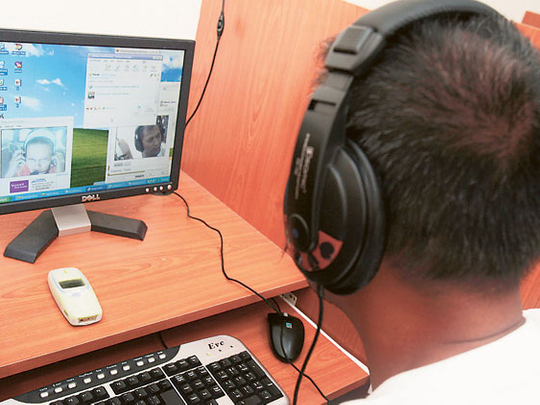
The business model for any telecom operator deploying Voice over Internet Protocol (VoIP) is simple enough – keep the tariffs down. It will not be any different in the UAE as and when the operators decide to go ahead with the launch.
VoIP telephony allows users to make phone and video calls and send text messages to mobiles and land-lines using the internet for free or at costs well below those charged by traditional network operators.
“Etisalat has been facing a number of headwinds over the last couple of years – slowing revenue growth, high debt and rising competitive intensity in the domestic market,” said Bhanu Chaddha, senior telecom analyst at the consultancy IDC.
However, Chaddha reckons both du and etisalat have been slow to take up VoIP technology as a commercial service in the local market, primarily on concerns over the cannibalisation of its fixed-line service revenues.
Last October, etisalat unveiled plans to offer VoIP as part of its ‘ePlus’ mobile platform that will likely include social networking, internet browsing and instant messaging, but customers are still waiting. It is believed that the pricing issue needs to be settled with TRA.
“They are waiting to get approval from the TRA on how to price the service,” said Matthew Reed, principal analyst at Informa Telecom and Media. “That is where it stands according to my knowledge and I haven’t heard from du about VoIP. The success depends on the price and quality of service.”
The TRA’s VoIP policy, announced in 2006, clearly states that only licensed operators are allowed to provide VoIP services in the UAE.
According to the TRA, Skype and other VoIP services are considered telecommunications services that are subject to the regulation and licensing as per the Federal Law by Decree (3) of 2003 (Telecom Law).
VoIP services are regulated generally by TRA’s regulatory framework and specifically by VoIP Regulatory Policy ver.2.0 issued on December 30, 2009. This policy replaced the earlier version issued on December 26, 2006.
Skype, the most popular VoIP service in the world, is blocked in the UAE. Users who have downloaded Skype outside of the country can use the software to make calls to other Skype users.
“The expected liberalisation of the fixed services market would allow du to compete head-to-head with etisalat in all locations across UAE,” said Chadda.
“The VoIP offering is seen as a means to safeguard its dominant position. Notwithstanding the regulatory hurdles and debate around the legality of VoIP services like Skype and Google Voice, success will depend heavily on pricing and quality of service.”
TRA’s ban has failed to stop VoIP’s soaring use among the local populace.
Because of the nature of the market where expatriates make up more than 75 per cent of the resident base, telcos generate substantial revenues from international dialling.
Since voice revenues are falling, “telcos are looking at other options like VoIP to boost revenues,” Reed said.
TRA, Skype and du did not respond to Gulf News’s queries on the VoIP commercial service status.
Etisalat’s Matthew Willsher, chief marketing officer, had this to say: “Etisalat is developing a comprehensive application which will allow subscribers to make high quality video and voice calls, leveraging VoIP technology in addition to utilising social networking applications.
“This service will be commercially launched in coming months.”
Mohammad Al Ganem, Director-General of TRA, during a recent Twitter session, said that Skype would be unblocked as soon as the company applied for a telecom licence in the UAE. “It is purely a licensing matter,” he said. “I hope they come to TRA for a licence.”
But Skype is never going to apply for a licence to operate in the UAE because its policy eschews applying for licences anywhere. That’s why it’s free.
The research firm Point Topic projects Skype as having 663 million registered users at the end of 2010 (up 89 million over the year), with 145 million registrants using the services at least once a month. However, only 8.8 million Skype registrants paid any money for the services, generating revenues of $859.8 million.
Skype, which operates in 150 countries without any restriction, is unlikely to work in the UAE until the TRA decides to revise its position on regulating VoIP services.
The number of full-service VoIP (subscription service) users stood at 135.4 million in 2011.










